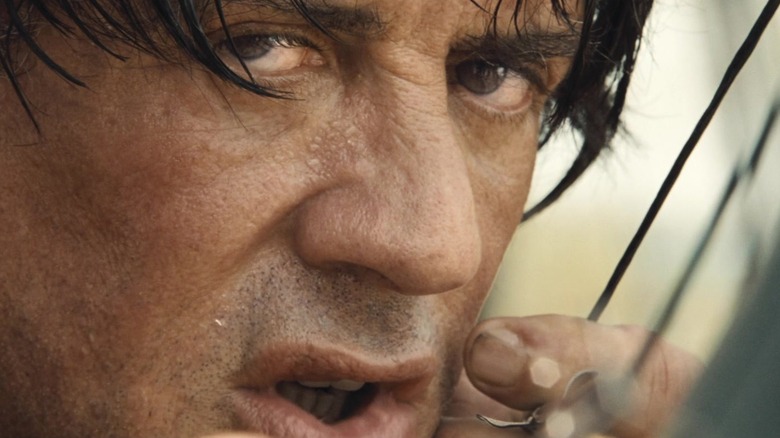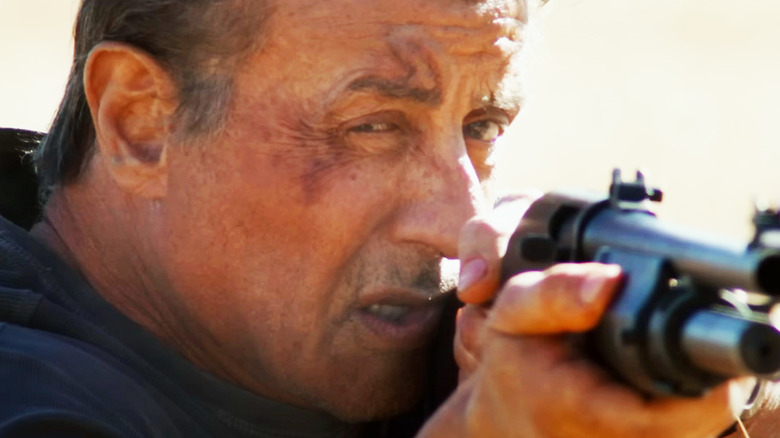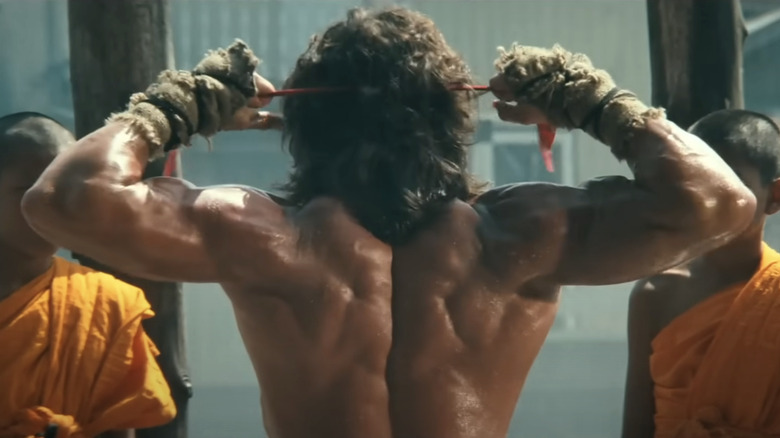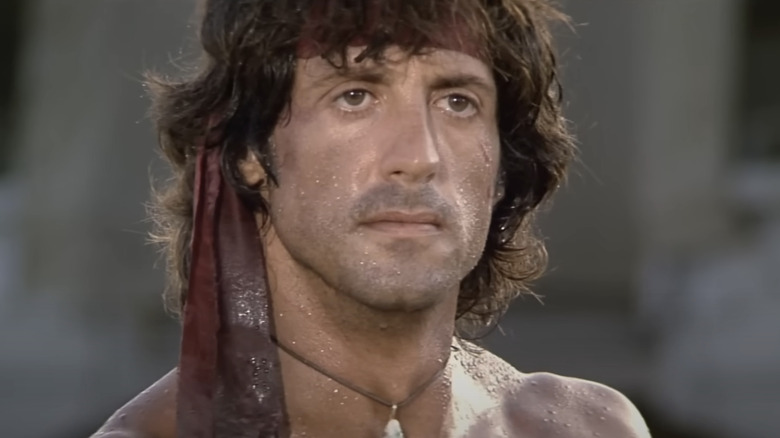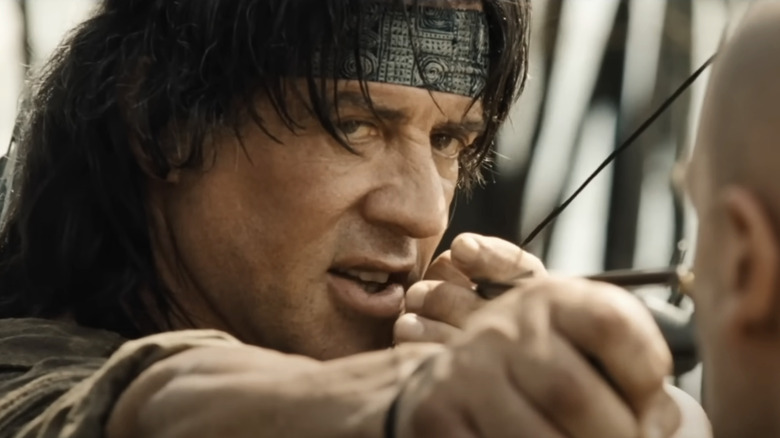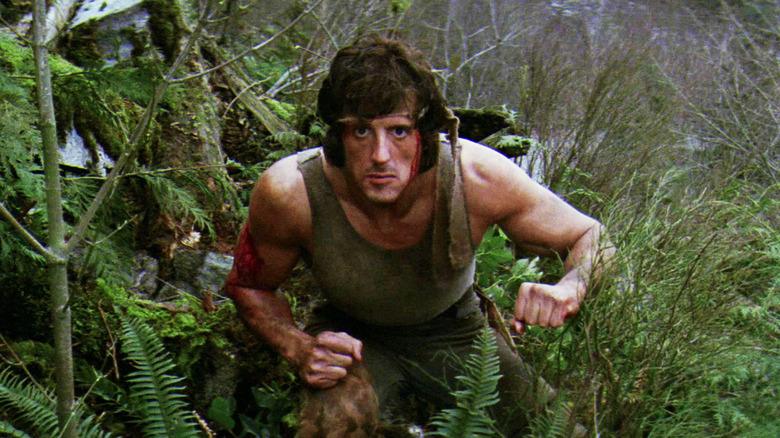The Rambo Movies Ranked From Worst To Best
Sylvester Stallone's "Rambo" movies might not be as beloved as his "Rocky" films, but they've had just as fascinating a trajectory. What's more, they've been incredibly influential in the history of action movies, charting the general evolution of the genre across four decades. If you want to get an insight into the state of action filmmaking at a certain time, "Rambo" films are a good gauge.
"First Blood," the inaugural "Rambo" film, was noteworthy for blending what are now well-known action tropes with an attempt at exploring the very real issue of PTSD in the context of the Vietnam War. Stallone's John J. Rambo was introduced as a former United States Army Special Forces officer who despite his preternatural combat skills was haunted by his experiences overseas. Following that, the character of Rambo underwent somewhat of a transformation throughout the '80s, becoming the epitome of the muscle-bound, invincible heroes that we often associate with the decade.
Though Stallone's action hero disappeared during the '90s, he re-emerged in the 2000s to deliver a much more gritty and reflective installment in the series with "Rambo" — a film that successfully balanced Stallone's measured and thoughtful performance with the type of gratuitous violence we'd all been expecting from John J.'s return. The man himself would be back a decade later, but this installment was about as memorable as the generic streaming films amidst which Rambo re-emerged.
But we're not here for a deep dive into Rambo's evolution, or for a guide on the best order to watch the "Rambo" movies. We just want to know which ones are good and which ones are rubbish. Luckily, I've figured that out for you, so read on for a ranking of the "Rambo" movies from worst to best.
5. Rambo: Last Blood (2019)
As the "Rambo" series went on, the films turned body mutilation into an art form, with the later installments fetishizing gratuitous ultra-violence in a way that at times felt like a modernized take on the over-the-top brutality of the '80s actioners this series epitomized (as with 2008's "Rambo"), and at other times just felt needlessly graphic. Such was the case with 2019's "Rambo: Last Blood," which once again found Sly Stallone's hero in full "I'm just trying to live my life, leave me alone" mode.
In this latest (and potentially final) "Rambo" effort, John is retired and living on his dad's Arizona ranch, which he tends to alongside friend Maria Beltran (Adriana Barraza), and her granddaughter, Gabriela (Yvette Monreal). Of course, this is a "Rambo" film, so things don't stay so quiet and picturesque for long. In "Last Blood," Stallone's ex-Special Forces officer goes after a Mexican cartel who take Gabriela hostage, leading to a final showdown that's vaguely reminiscent of "Skyfall" and its "Home Alone"-esque ending, wherein Rambo booby traps his ranch with all manner of lethal contraptions designed to lay waste to the cartel. The ending of "Last Blood" sees Rambo mounting a horse and riding off into the sunset, which is a shame because it insinuates that the man's work is done with what is the most lackluster entry in the whole franchise.
Any pretensions towards exploring the psychological effects of war are abandoned in "Last Blood," which indulges in the all-out violence of its direct predecessor while failing to make its central character believably layered. The script also left much to be desired, leaving Rambo with a generic, anticlimax of a send-off that felt very much like all the other one-dimensional actioners with which the streaming age has cursed us.
4. Rambo III (1988)
Nowadays, invincible action stars are once again cool, thanks mostly to our friend Mr. John Wick. But when it comes to this cinematic trope, no one besides perhaps Arnold Schwarzenegger epitomized it better than Sly Stallone and Rambo."Rambo III" is the perfect example.
Whereas the series had started out melding thoughtful explorations of post-Vietnam trauma with taut action, the franchise quickly ratcheted up the action and abandoned the more reflective aspects. By the time we got to "Rambo III," the titular war vet had become a paragon of that now ubiquitous action movie standard: the one-man army. The threequel saw Johnny pretty much taking on the Soviet Union single-handedly in order to free his former commanding officer, Colonel Troutman (played by a returning Richard Crenna, who'd appeared in the saga since its inception), from the Ruskies holding him hostage. At the time, it was the most expensive film ever made, with all $63 million seemingly being spent on making Rambo into an unstoppable killing machine.
For comparison, Stallone was convinced the first film in the franchise, "First Blood," would ruin his career, precisely because the original script was full of the kind of over-the-top action and cliché dialogue that made the third film so absurd. He thereby set about rewriting the script so that his character doesn't actually kill anyone. Contrast that with "Rambo III" and its incessant and bombastic murderous rampages and it's easy to see why some thought the franchise had lost its way with this entry. Still, if you like the kind of cheesy '80s actioner that helped inspire the great Rainier Wolfcastle, one of the best characters on "The Simpsons," "Rambo III" might well be for you. As this list goes, however, there are simply better films more deserving of a higher ranking.
3. Rambo: First Blood Part II (1985)
"Rambo III" is the point at which Rambo became little more than an overblown parody of his former self, while "Rambo: First Blood Part II" is the point at which he began that transition. But for some reason, this movie is enjoyably bad in a way that the third installment perhaps isn't.
There's no doubt this bewilderingly-titled movie from director George P. Cosmatos really did jettison all the political and social commentary from the first installment in favor of portraying its hero as the kind of superhuman action paragon the '80s is famous for birthing — though "Part II" retains the affectation of criticizing American foreign policy. The film also saw Rambo dispose of his no-killing rule from the first movie and embark on nothing short of a murderous rampage, disposing of no less than 75 bad guys on-screen throughout the film's runtime. It's worth noting that this was right as the rivalry between Sly and Arnold Schwarzenegger was heating up, with both stars attempting to outdo each other in every way. As Arnie recalled during a 2017 Q&A:
"It became a competition about who has the most muscular body. [...] Who has the most unique killings? Who kills more people on screen? Who makes more money at the box office? Who has less body fat when he goes into production?"
"First Blood Part II" represents the point where Stallone really started ratcheting up his side of this battle, and though the movie itself is a pretty schlocky entry in the franchise, it's also just a lot more fun than the third one.
2. Rambo (2008)
Just like he did with 2006's "Rocky Balboa," Sylvester Stallone returned to one of his most well-known characters in the early '00s and gave him a much more modern, gritty sensibility. 2008's "Rambo" is notable for re-introducing some of the character-driven drama of the original, returning John Rambo to a version of the haunted ex-Special Forces officer we saw in "First Blood." But make no mistake, "Rambo" has plenty of the absurdly over-the-top violence of "Rambo III" only this time it was more graphic than ever. The third act is a symphony of severed limbs and waves of carmine viscera perpetually suspended in mid-air like some sort of perverse art piece.
The film depicts Rambo as a reclusive vet living in Thailand who just wants to be left alone. Though that in and of itself sounds like enough to immediately launch "Rambo" into action cliché territory, Stallone plays Rambo in a way that makes him believably jaded and scarred by his past experiences, establishing a sense that we're finally revisiting the John Rambo of the original film some 27 years later. Though he's reluctant to get involved in any conflicts, things do, of course, ratchet up pretty quickly when Rambo is pulled into a mission to recover some missionaries who have gone missing.
Despite the gratuitous finale, however, there's a real sense of seriousness to "Rambo" that feels akin to "Rocky Balboa" in the sense we're not only seeing Rambo grapple with his past, but Stallone himself reflecting upon his career and experience with a stoic, knowing aura that really elevates the film.
1. First Blood (1982)
Though it's pretty tame by today's standards, this film really is responsible for much of what we understand modern action movies to be. Look, Sly Stallone is a smart guy. These days, he might be more well-known for his brawn, but if you watch him in this 1977 BBC interview, he comes across as eloquent, insightful, and thoughtful. It was exactly these traits that the actor brought to 1982's "First Blood." During a 2005 Howard Stern interview, Stallone laid out how he came to film when it was very much the kind of schlocky actioner that he himself would be guilty of propelling in subsequent years. So, the ever-insightful actor who'd penned "Rocky" himself just six years prior, went to work deconstructing the "First Blood" script, which had been adapted from David Morrell's 1972 novel of the same name, and putting it back together — stripping much of his dialogue in the process and relying on other characters to build up the Rambo mystique. The final result was a film that balanced memorable action sequences with the exploration of war-induced PTSD from Morrell's book.
Consequently "First Blood" remains an example of how to construct an action hero the right way, with characters other than the protagonist talking up Rambo's pre-eminent, almost superheroic abilities, establishing a real mystique around the character. What's more, Stallone insisted that Rambo not kill anyone in the movie. It's therefore a testament to the quality of "First Blood" that it stands as the best in a series well-known for its violence and bombastic action and yet doesn't contain a single instance of Rambo killing a bad guy.
